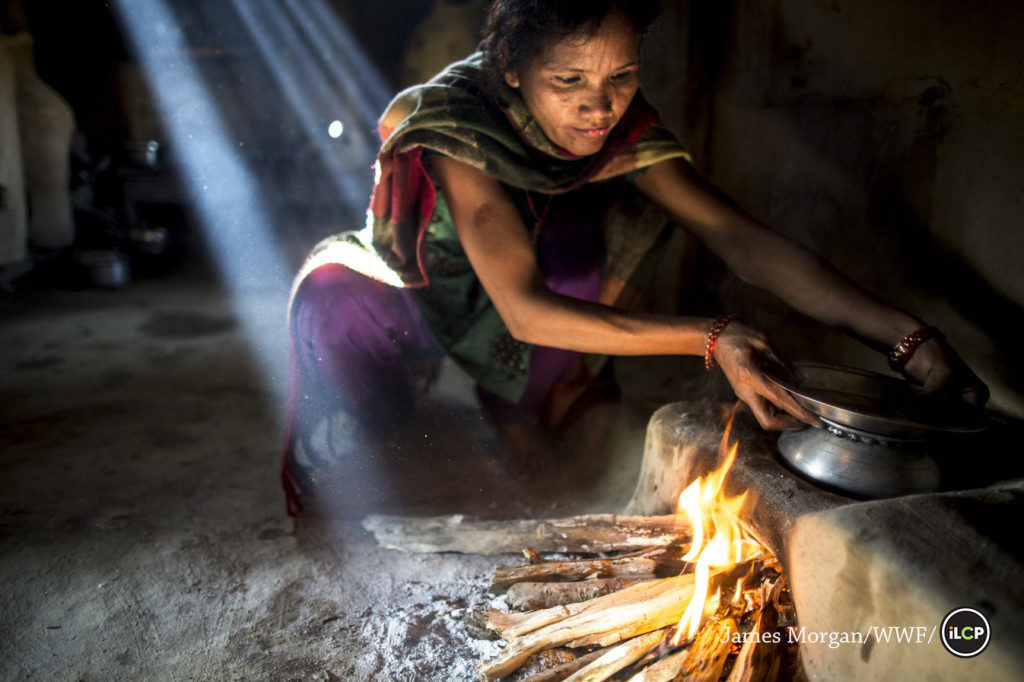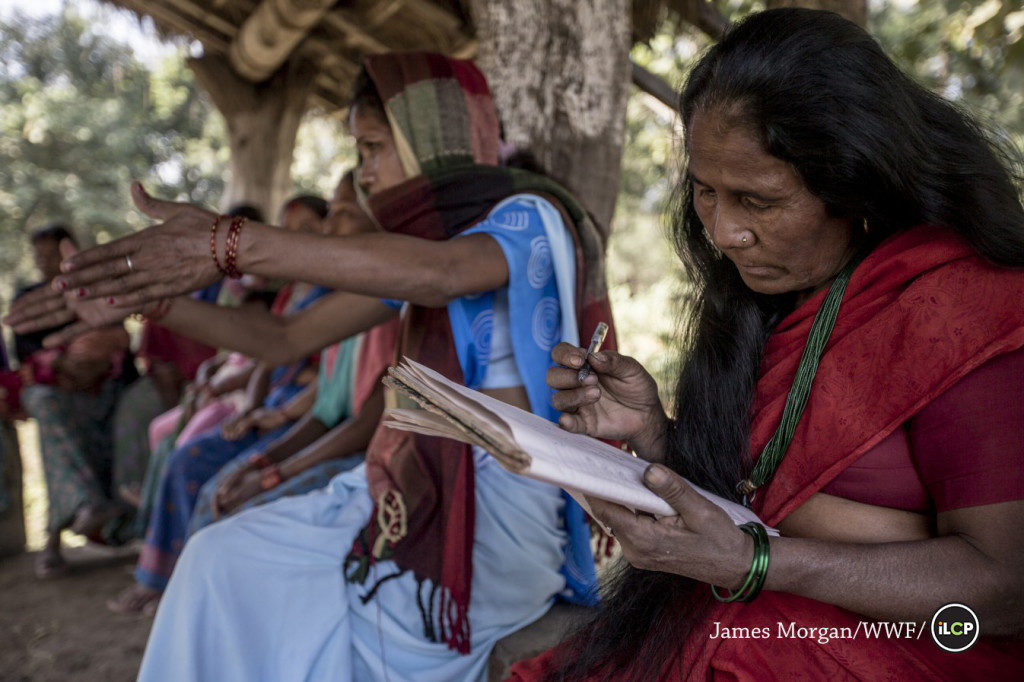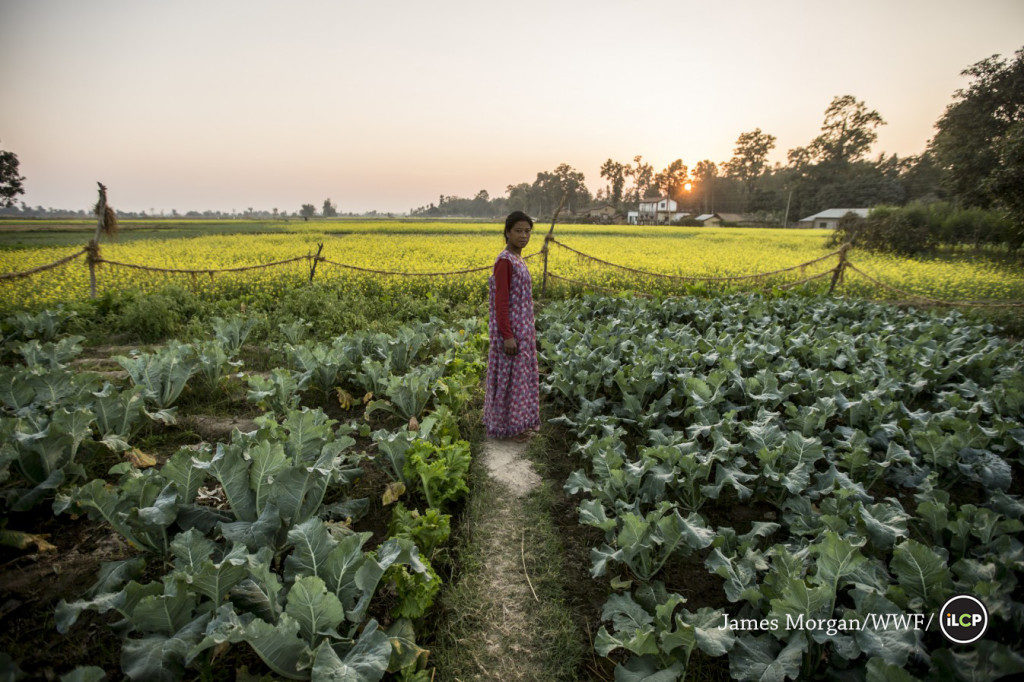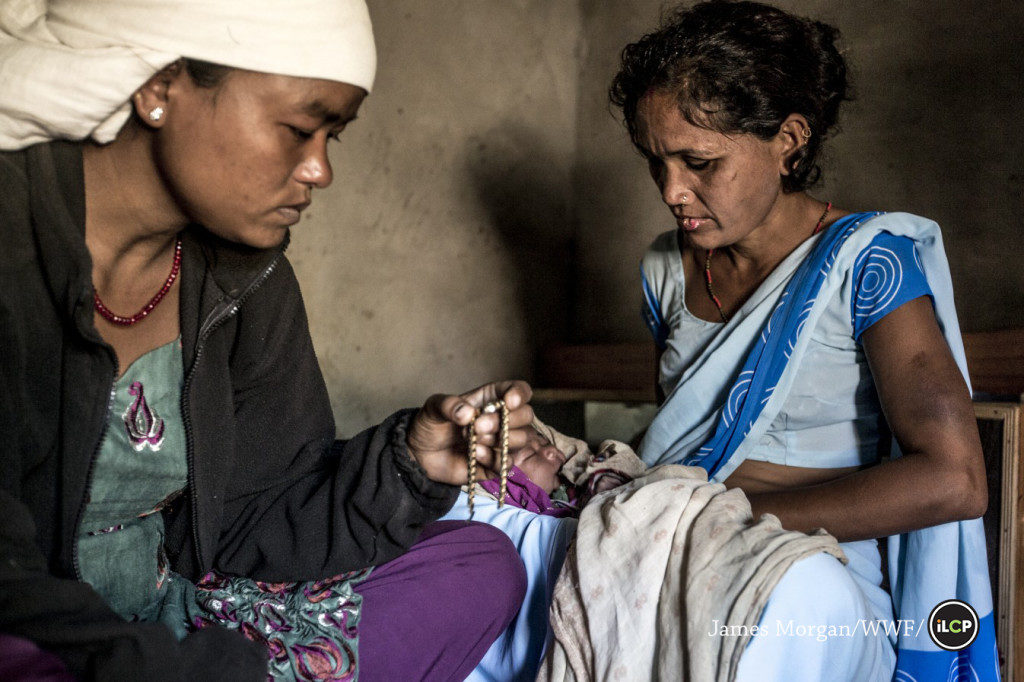Photos by iLCP Fellow James Morgan.
This article is published with permission from James Morgan. You can follow him in his social accounts at @jamesmorganfoto and his website www.jamesmorgan.co.uk

Devi KC is 35 years old. She is the secretary of the Gauri Mahila Community Forest User group in Khata Corridor, Bardia district and is also a Female Community Health Volunteer. She has been actively involved in conservation initiatives for the past 12 years. WWF and CARE have provided her with guidance and services that helped her get to this point. Here she prepares lunch at her home in Dhoderi village, Bardia, Nepal.
Devi KC is 35 years old. She is the secretary of the Gauri Mahila Community Forest User group in Khata Corridor, Bardia district and is also a Female Community Health Volunteer. She has been actively involved in conservation initiatives for the past 12 years. WWF and CARE have provided her with guidance and services that helped her get to this point. Here she prepares lunch at her home in Dhoderi village, Bardia, Nepal.
At high noon, Devi KC is still deep in the daily chores she started at sunrise: brewing tea and cooking a meal of rice, lentils and spinach for her husband and teenage son; pumping and hauling water from the nearby well; harvesting hay from her field; and sweeping dirt from her front porch.
Despite a long list of other tasks to complete, Devi grabs a small bag and walks with authority down a short, dusty dirt road to the home of a family that needs her help. After meticulously washing her hands, she enters the dimly lit bedroom of a woman cradling a baby.
Devi is there to do a basic examination of the baby, whom she delivered a week earlier. Sitting on the bed, she checks the infant’s temperature, heartbeat and skin. All is well, she tells the tired-looking mother, who smiles with relief. Devi, the mother of two grown children, can relate.

Devi is performing routine check ups on a baby that she delivered 12 days ago for Chandrika Tharu. Bardia, Nepal
Helping others be healthy is only one of the responsibilities Devi has taken on in her remote village, where she serves as a community health volunteer. She is 35 years old, and one of approximately 50,000 people trained in everything from sanitation and nutrition to modern hygiene.
Devi lives in Khata, within the long, narrow Terai Arc landscape, which spans nearly 20,000 square miles of northern India and southern Nepal. The region holds endangered one-horned rhinos, elephants and the world’s largest concentration of tigers. Communities here depend on the forest for food, water and shelter, as well as firewood and income. This is especially true for women, who dominate rural society as many of the men travel abroad to find work.
When asked what has motivated her to volunteer for the past 14 years, Devi says, “I want my friends and family to live long lives.” But she is also motivated by her concern for the forests. “If people are not healthy, they won’t have energy for things like protecting the environment,” she adds. And she knows that without that protection, the natural resources they rely on will disappear.

A group of women go to work in Mahila Jagaran Community Forest, a community forest run solely by women, Karnali corridor, Nepal.
Despite their importance to people, Terai forests are under pressure. Trees are unsustainably harvested to provide wood for heating and cooking, or to clear space for farms and livestock. One of Nepal’s approaches to addressing this and other threats is empowering people—particularly women—to be good stewards of the land. “I do not get money for doing this, but it gives me satisfaction,” Devi adds. “I know people in my village appreciate it.”
The health issues Devi deals with are basic, yet critical. She spends a lot of time teaching people in her village about hygiene. “I tell them,” she explains, “wash your hands thoroughly. Take off your jewellery, scrub soap from the tips of your fingers to the top of your elbows five times on each arm.” She also teaches them to brush their teeth daily; trust modern medicine; use a toilet instead of the woods; only drink water that has been tested for arsenic and bacteria; and eat nutritious food.
After her house call, Devi walks a half-mile to the concrete building that serves as the village resource centre. Its salmon-coloured walls house two rooms for holding workshops and a bare- bones health clinic. In most rural Nepali communities, the only health care options are struggling health centres and mobile “health camps,” where doctors from urban areas come once or twice a year to see rural patients. Before they arrive, community health volunteers like Devi share the most pressing needs of the villagers with the doctors to make the most of their time and ensure the correct medications will be available.
WWF steps in the rest of the year, working with, or through, numerous partners to offer advice on everything from basic health to family planning, emphasizing the importance of women’s wellness and the benefits of spacing out pregnancies. All of this is taught under the umbrella of helping people and the planet thrive.

Devi teaches other women in her community the nutritional and environmental advantages of organic agriculture at scheduled meetings in her village
On this day, in a shaded area near the resource centre, two dozen women sit on benches and listen to Devi. Their silence and attentiveness are clear signs of her authority. Devi is somebody they trust. She took the initiative to start making her life and her surroundings more sustainable, and they seem eager not just to learn from Devi but to be as physically and mentally strong, as mindful of the environment, and as confident as she appears.
Today’s lesson is about vegetables. Devi urges them to eat cauliflower, spinach, eggplant and whatever else is in season. Doing so, she explains, will give them more time and energy; instead of traveling miles to the outdoor markets that sell produce, they can grow it at home. After the meeting, Devi hands each of them several vegetable plants to grow in their yards. There is a happy buzz in the air as they walk away.

Tomatoes being grown in Madhu Ban Village where WWF has helped introduce the use of bio gas and organic farming practices. Switching from a wood-fuelled cooking fire to a biogas flame saves trees and time, reduces greenhouse gas emissions and prevents health problems.
Tomatoes being grown in Madhu Ban Village where WWF has helped introduce the use of bio gas and organic farming practices. Switching from a wood-fuelled cooking fire to a biogas flame saves trees and time, reduces greenhouse gas emissions and prevents health problems.
Devi’s work fits into a larger tradition of community leadership on many issues, including conservation, which is a high priority for Nepal’s government. In fact, the country has offered its people the opportunity to lead, coordinate and execute much of its on-the-ground environmental work. For example, they’ve been given the right to manage and restore several tranches of government-owned forest land, and about 35% of the population has chosen to do so.
Those people now work in Community Forest User Groups (CFUGs), where they learn how to restore overused or otherwise threatened forests, and also sustainably harvest wood to use in their homes or sell in markets. They’ve done so on nearly 4 million acres of forest land.

Women work to clear weeds in Mahila Jagaran Community Forest, a community forest run solely by women, Karnali corridor, Nepal.
The government’s support for conservation is a huge boon to people like Devi, whose journey was also aided by WWF. Through workshops led by WWF—often in cooperation with partners like CARE and the Family Planning Association of Nepal—she and more than 10,000 rural residents have learned about the importance of good health.
Bhaskar Bhattarai, a senior field project officer at WWF-Nepal, reiterates Devi’s perspective on the conservation-health connection: “We need to address the people’s most immediate needs first. Their primary need is health … they want relief. If we can help them with these issues, they’ll have energy to care about other things like conservation—which doesn’t have a short-term payoff like taking medicine, but is very important.”
There is a tremendous need for this work. In rural Nepal, only 13% of households use an appropriate water treatment method for drinking water. Less than 25% of homes have bio-gas cookstoves—which run on fuel from livestock dung and human waste—while most people rely on less environmentally friendly wood or coal. And only 38% of households have toilets.
To help remove pressure on the forest and secure cleaner waters, WWF subsidizes the cost of constructing toilets and bio-gas plants. Those amenities give community members health and environmental benefits—and time. In many developing countries, women spend more than eight hours a day just traveling to get water. But when they have water filters, they don’t need to walk miles looking for a clean source. And when they have bio-gas stoves, they spend less time gathering wood from the forests.
In addition to her other tasks, Devi also helps protect one such forest, a 125-acre stretch of woods around a Hindu temple. When she first moved to the area, she couldn’t see the temple from her home: trees completely obscured it. But a year later she could, after the forest was stripped clean by people stealing wood to sell. That year Devi helped create a group to maintain the forest, and the community successfully petitioned the Nepali government for the authority to plant trees there—and manage them for sustainable harvest.

A farmer in Madhu Ban Village where WWF has helped introduce the use of bio gas and organic farming practices. Switching from a wood-fuelled cooking fire to a biogas flame saves trees and time, reduces greenhouse gas emissions and prevents health problems.
In addition to educating communities about how to sustainably manage their forests, WWF also works with people to fight the devastating impacts of wildlife poaching, and provides training and equipment to stop the spread of fires.
“The success of the WWF-Nepal program largely depends on the participation of local people,” says WWF-Nepal Senior Conservation Program Director Dr. Ghana Shyam Gurung. “Conservation work has to benefit them, and be done with their help. That’s why we call our work ‘conservation with a human face.’”
Women’s empowerment is the last piece of the puzzle. In developing countries, it’s a WWF priority to ensure that women have the power to make decisions about what happens in their lives, homes and communities. This is essential in Nepal, where many women are single-parenting because their husbands have had to emigrate to find work. Programs like the workshops Devi attended are part of the effort to increase women’s influence.
It’s been widely reported—and a range of studies show—that empowering women is critical to conservation. Women are more risk-averse than men, and thus more likely to make decisions that minimize risks for their families and communities. They’re also more willing to change their strategies in response to new information.
Shubash Lohani, director of sustainable landscapes for WWF’s forest program, reiterates the point. “Women do most of the work in rural communities,” he says. “They are the ones collecting firewood or fodder from the forests or fetching water from the faraway spring. Given how connected women are to nature, they are the most knowledgeable about natural resources and their connection to better livelihoods. Communities without empowered women are missing the backbone that strengthens them and helps them climb out of poverty.”
All of the work devi does in her community, with national organisations and global conservation groups, comes down to a simple fact: she loves and values the natural world. That love dates back to her childhood, when she chased monkeys through the forests on her one-hour walk to school. Now she wants a healthy environment for her neighbours and country—and better opportunities for her children.
“From the time I get up in the morning until about 10 at night, I am connected with nature,” she says, as her husband and son gather around her at the end of the day. “Me and nature—we have a good relationship.”
All text © Jill Schwarz/WWF , with additional reporting by Sarah Wade. Edited from its original appearance in the WWF Magazine.
This article is published in Rising Junkiri with permission from iLCP Fellow James Morgan. All comments and compliments can be send to Jame’s website

The children of Jalpa Bista, chairperson of Mahila Jagaran Community Forestry User Group, at home in Karnali valley, Nepal.





